What is the story about?
What's Happening?
Iranian oil exports to China have come under renewed pressure, with exports falling from an average of 1.52 million barrels per day (bpd) over the previous three months to 1.4 million bpd in September. This decline follows the imposition of snap-back sanctions against Iran on September 28, triggered by a mechanism in the 2015 nuclear agreement. The sanctions, backed by the United Nations, broaden the scope of restrictions on Iran. Despite previous resilience, Iran's capacity to maintain its oil exports is now jeopardized by these sanctions and the U.S. Treasury's recent enhancement of anti-Iranian sanctions, targeting 100 individuals, entities, and vessels associated with crude oil and LNG.
Why It's Important?
The decline in Iranian oil exports to China is significant as it reflects the impact of international sanctions on Iran's economy and its ability to sustain its confrontational political stance. The sanctions aim to curb Iran's financial resources, which are crucial for its political and military activities. The pressure on Iran's oil exports could lead to economic instability within the country, affecting its domestic and foreign policy decisions. Additionally, the situation highlights the geopolitical tensions between the U.S., China, and Iran, with potential implications for global oil markets and international relations.
What's Next?
With the U.S. Treasury's recent sanctions targeting key players in Iran's oil trade, further declines in Iranian oil exports are anticipated. The U.S. may increase its focus on enforcing these sanctions, potentially leading to vessel seizures and cargo confiscations. As the sanctions regime tightens, Iran may seek alternative methods to evade restrictions, such as utilizing dark fleet vessels or engaging in barter arrangements. The international community, particularly BRICS nations, may face pressure to conform to the UN sanctions, impacting their trade relations with Iran.
Beyond the Headlines
The renewed pressure on Iranian oil exports underscores the complexities of international sanctions and their enforcement. It raises questions about the effectiveness of sanctions in achieving political objectives and the ethical implications of restricting a nation's economic activities. The situation also highlights the challenges faced by countries like China in balancing their trade relations with Iran against international pressure. As the sanctions regime evolves, it may lead to shifts in global oil trade patterns and influence diplomatic relations among key stakeholders.















